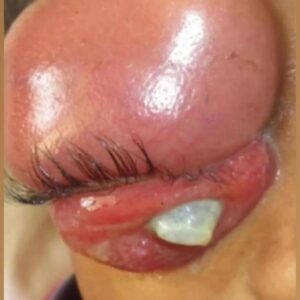1. Restless leg syndrome: This ailment, which suggests an underlying issue, may be indicated by crawling or creeping sensations in the legs.
2. Thickened skin: Eczema, allergies, and hormone imbalances can all cause thickened skin, which calls for medical evaluation for an accurate diagnosis and course of treatment.
3. Handwriting changes and loss of smell: These changes can be early signs of Parkinson’s disease, emphasizing the need to keep an eye on changes in movement and sensory perception.
4. Aggressive behavior: The significance of mental health in general well-being is highlighted by the possibility that unexplained aggression is a sign of depression.
5. Sleeping too much: Hypersomnia, a condition marked by extreme sleepiness, may be related to autoimmune diseases and call for a medical assessment.
6. Color changes in the eyes: A white or grey ring surrounding the cornea may indicate elevated cholesterol, particularly in those under 45. This emphasizes the importance of getting a cardiovascular assessment.
7. Having a persistent taste for salty foods: This may indicate an iron shortage, anemia, dehydration, or premenstrual syndrome, all of which require medical treatment.
8. exhaustion and low libido: Long-term exhaustion and low libido may be signs of thyroid hormone problems, which can affect vitality and general health.
9. Excessive thirst: There are a number of reasons why someone can have persistent thirst, such as food preferences or underlying medical issues like diabetes or pregnancy, which call for careful examination.
10. Ice craving: Iron deficiency or anemia may be indicated by persistent ice cravings, which may require blood testing for confirmation and proper treatment.
It is crucial to recognize these warning indicators and get medical attention when necessary in order to maintain optimal health. Early indicators of possible health problems are frequently provided by our bodies, and paying attention to these signals can help ensure prompt care and enhanced wellbeing.


